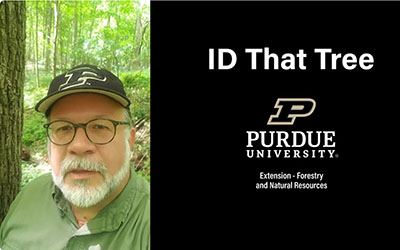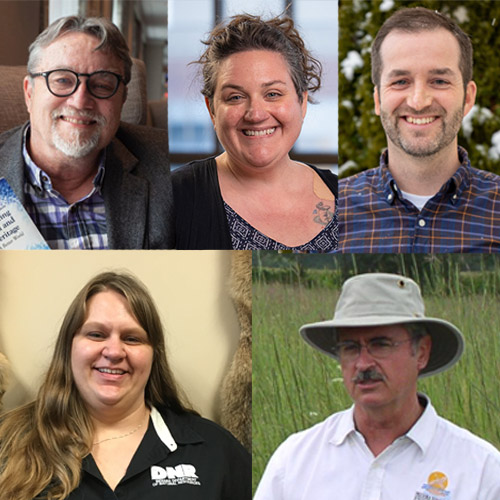Flaherty, Pluimer Earn College of Agriculture Excellence in Teaching Awards
Dr. Elizabeth Flaherty, associate professor of wildlife ecology and habitat management, and Julie Pluimer, academic advisor and administrative manager of the Forestry and Natural Resources Office of Student Services, were recognized for their excellence by the Purdue College of Agriculture with 2022-23 Faculty and Staff Teaching Awards.
Flaherty was named as the John T. Taylor Excellence in Teaching Innovation award recipient, while Pluimer was honored with the Outstanding Service to Students Award.
The Taylor Excellence in Teaching Innovation Award, introduced in 2022, recognizes tenure track or tenured faculty with at least three years of teaching undergraduates for their use of innovative teaching practices that contribute to improved learning and improved educational experiences for students.
The Outstanding Service to Students Award recognizes staff or non-tenure track faculty for outstanding, sustained service to students (e.g. advising, placement, registration, counseling, faculty fellow in residence hall, learning community leader, etc.)
Both Flaherty and Pluimer will be formally recognized at the Celebration of Teaching Excellence event on Nov. 29.
Dr. Elizabeth Flaherty – 2022-23 John T. Taylor Excellence in Teaching Innovation
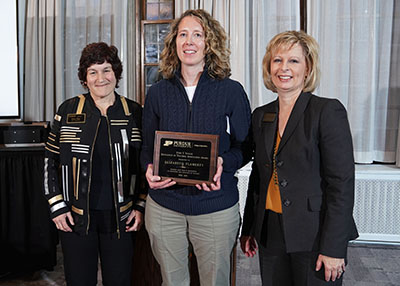 Flaherty joined the Purdue FNR faculty in 2013 as an assistant professor of wildlife ecology and habitat management. She was promoted to associate professor in 2019. Throughout her time at Purdue, Flaherty has been continually honored for her teaching prowess, including the 2020 National Award for Excellence in College and University Teaching in the Food and Agricultural Sciences from the USDA.
Flaherty joined the Purdue FNR faculty in 2013 as an assistant professor of wildlife ecology and habitat management. She was promoted to associate professor in 2019. Throughout her time at Purdue, Flaherty has been continually honored for her teaching prowess, including the 2020 National Award for Excellence in College and University Teaching in the Food and Agricultural Sciences from the USDA.
She also earned the 2020 Murphy Award and received the College of Agriculture’s Kohls Undergraduate Teacher Award (Much to learn from annual Celebration of Teaching Excellence)
Flaherty teaches three of the required courses in the wildlife major: Wildlife Habitat Management, Wildlife Investigational Techniques, and Forest Habitats and Communities. She also teaches the Optimizing Conference Attendance course, developed alongside FNR colleague Dr. Pat Zollner, as well as a graduate-level required Intro to Teaching Natural Resources course. Flaherty also has led study abroad courses in Cuba (2016) and Ecuador and the Galápagos Islands in 2019 and August 2023.
Flaherty’s teaching focuses on active learning and uses a hybrid-flipped design where she asks students to complete readings or watch videos before class so they can actively engage during formal lecture time. She includes relevant, real-world examples, including those from her own research and experiences, to increase students’ interest in and connection to course content. For example, in the Wildlife Techniques course, she shares stories and photos from her work with American martens in Southeast Alaska to build students’ interest, while teaching them how to use Excel for calculations and basic population modeling by creating life tables using demography data from her own research.
Students in her Wildlife Investigational Techniques course practice their skills through a variety of activities ranging from animal necropsy to chemical immobilization, live-trapping eastern cottontail rabbits and raccoons at the Purdue Wildlife Area, mist-netting and banding birds, vegetation sampling and camera trapping. In her Wildlife Habitat Management course, students complete a semester-long small group project to develop a species-specific management plan for two Purdue-owned properties, including choosing sampling techniques and selecting appropriate analysis methods, all while acquiring teamwork, writing and analytical skills.
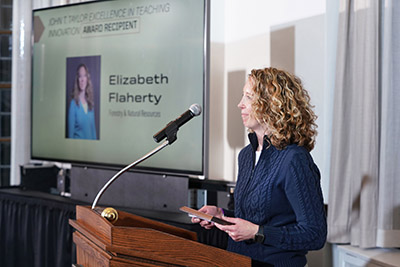 Dr. Flaherty developed an innovative course with Dr. Pat Zollner in 2014 entitled “Optimize TWS Meeting Attendance,” which prepares undergraduate students to attend the annual meeting of The Wildlife Society, including discussions of general meeting etiquette, appropriate clothing and other cultural and social aspects specific to the wildlife field. Students also had 10 tasks to complete while at the TWS meeting, and met daily with instructors to reflect on their experiences. In 2016 and 2018, Drs. Flaherty and Zollner partnered with instructors at other institutions who taught similar courses. In 2021 the course was revised to accommodate the online version of the conference.
Dr. Flaherty developed an innovative course with Dr. Pat Zollner in 2014 entitled “Optimize TWS Meeting Attendance,” which prepares undergraduate students to attend the annual meeting of The Wildlife Society, including discussions of general meeting etiquette, appropriate clothing and other cultural and social aspects specific to the wildlife field. Students also had 10 tasks to complete while at the TWS meeting, and met daily with instructors to reflect on their experiences. In 2016 and 2018, Drs. Flaherty and Zollner partnered with instructors at other institutions who taught similar courses. In 2021 the course was revised to accommodate the online version of the conference.
In receiving feedback from students interested in gaining more research experience, Flaherty along with three colleagues led the development of a course to introduce students to research, which began in the fall of 2022. This course has allowed her to increase the number of students she can mentor and support on undergraduate research experiences.
In addition to her teaching role, Flaherty mentors students inside and outside of the classroom. Each semester she has several undergraduate students actively involved in research in her lab either working on their own projects or collaborating with graduate students. Recently she developed partnerships with state management agencies on projects using stable isotope analysis to monitor freshwater mussel populations in Indiana and evaluating the impacts of baiting during the hunting season on population demographics of black bears in Maine. Her students co-author research manuscripts and often go on to attend national conferences to present their research results.
Flaherty not only impacts her students through teaching and mentorship, but also through the development of skills they will use in the professional world, such as critical thinking, collection and analysis of data, professional writing, and more. She also provides students with relevant, real-world examples using current events, her own research and experiences, guest speakers and readings from scientific journals and news articles.
Flaherty also has shared her knowledge of teaching innovations and methods through 19 peer-reviewed publications. She worked with other authors to develop activities in the new Women in Wildlife book published through The Wildlife Society this month. She is editing a special feature on undergraduate teaching for the Journal of Mammalogy and has led or co-led seven workshops with national audiences. She is a team member of Squirrel-Net, a group of mammalogists that developed a networked course-based undergraduate research experience (CURE) and has published four peer-reviewed CURE learning modules through CourseSource.
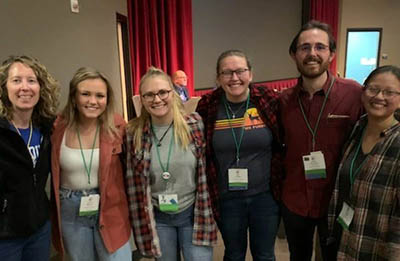 She is the advisor for the Purdue student chapter of The Wildlife Society and works with the chapter’s Quiz Bowl team, which won first place among all wildlife programs in the country at the TWS annual convention in 2019. Purdue’s Quiz Bowl team also posted podium finishes in 2022 (3rd), 2018 (3rd), 2017 (2nd) and 2016 (3rd). In April 2022, Flaherty was selected as Outstanding Club/Organization Advisor of the Year for the Purdue College of Agriculture, receiving the student-choice award as part of the College of Ag’s Spring Awards. Flaherty leads the group through professional development opportunities; through an optimizing conference attendance course, which prepares students to attend the national TWS conference; and mentors students in the club as well as in her lab and classes.
She is the advisor for the Purdue student chapter of The Wildlife Society and works with the chapter’s Quiz Bowl team, which won first place among all wildlife programs in the country at the TWS annual convention in 2019. Purdue’s Quiz Bowl team also posted podium finishes in 2022 (3rd), 2018 (3rd), 2017 (2nd) and 2016 (3rd). In April 2022, Flaherty was selected as Outstanding Club/Organization Advisor of the Year for the Purdue College of Agriculture, receiving the student-choice award as part of the College of Ag’s Spring Awards. Flaherty leads the group through professional development opportunities; through an optimizing conference attendance course, which prepares students to attend the national TWS conference; and mentors students in the club as well as in her lab and classes.
Flaherty was previously honored with the TWS Student Chapter Advisor of the Year Award in 2020 and the organization’s Excellence in Wildlife Education Award in 2021. The Excellence in Wildlife Education Award celebrates sustained exemplary teaching and contribution to the improvement of wildlife education by individual faculty members.
Julie Pluimer – Outstanding Service to Students
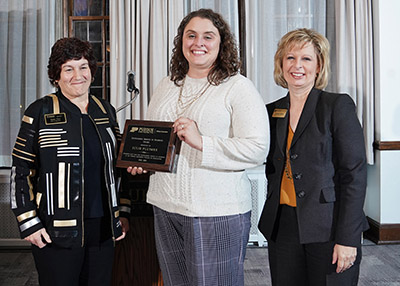 Pluimer joined the FNR staff in 2011 after beginning her career on campus as the graduate/undergraduate program administrator in the department of Botany and Plant Pathology in 2004.
Pluimer joined the FNR staff in 2011 after beginning her career on campus as the graduate/undergraduate program administrator in the department of Botany and Plant Pathology in 2004.
In her current role, Pluimer provides academic advising, undergraduate recruiting and administration of advising. She works with students across the department’s three majors - aquatic sciences, forestry and wildlife; serves as the lead instructor for FNR’s freshman learning community; and coordinates on-campus recruiting efforts. She also is a long-time member of the curriculum committee and serves as the advisor for the FNR Ambassadors.
Annually, Pluimer carries an advising load ranging from 100 to 250 students. She has always advocated for the wellbeing of students, helping the Office of Student Services transition from shared advising responsibilities to assigning students to individual advisors to provide better one-on-one support. She also has helped shape the advising structure in the department to focus on students as individuals.
As part of the Summer Transition, Advising and Registration (STAR) program, Pluimer has given presentations to newly admitted freshmen and their parents about the role of an academic advisor. She also has traveled to Purdue-Fort Wayne several times to speak about FNR majors to students in a freshman orientation course who were interested in transferring to the West Lafayette campus. Pluimer meet with the majority of prospective students who visit FNR and students already on campus who want to switch to an FNR major. She also meets with approximately 100 prospective or transfer students annually and represents FNR at Purdue, College of Agriculture and FNR sponsored events. After joining FNR many students remember their first meeting with her and comment on how much time she spent visiting with them.
“I met Julie for the first time in 2019 when I was an incoming freshman and she took me under her wing and has had my back ever since,” senior interdisciplinary agriculture major Lucy Sullivan said. “I was part of the Pathway to Purdue Ag Program. During this program, I was able to live on Purdue’s main campus and experience college life while taking half of my coursework at Ivy Tech and the other half at Purdue. Knowing that I could turn to Julie for help throughout my difficult time adjusting to college made my experience here much smoother. She has always been a mentor who I could ask for support when I was going through a difficult time or for academic guidance. She has demonstrated to me the positive impact that one individual can have on your academic career. Julie is a kind individual who demonstrates exceptional qualities. I consider her to be a superhero. I don’t think I could have succeeded – especially now that I’m in my senior year – without Julie by my side.”
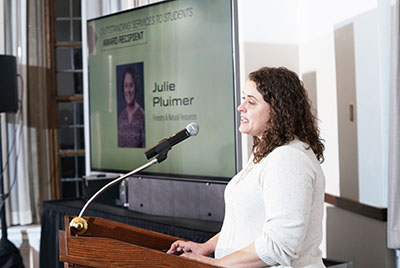 Pluimer is committed to being there for each student through the good and bad, with the goal of seeing her students through to graduation and beyond.
Pluimer is committed to being there for each student through the good and bad, with the goal of seeing her students through to graduation and beyond.
“I know Julie as both my former academic advisor and a friend, and likely would not have graduated without her direction, support and encouragement,” 2017 forestry alumna Whitney Irion said. “I applied to both Ohio State and Purdue and was accepted to both. After talking to Julie when I visited the Purdue campus, my decision was absolutely in favor of Purdue. Her kindness and enthusiasm to help every student drew me toward Purdue and the FNR Department. Purdue should be very proud of academic advisors like Julie. She is truly there for the students. She makes them feel welcome, helps them navigate a course of action that works for the individual and is there to support (them) as she helped me realize my dream.”
In addition to advising students on academics, Pluimer also provides career advice and connects them to clubs, classes, career experiences and research opportunities.
“I am extremely fortunate to have met Julie and to have her as an advisor,” junior forestry-forest management major Chelse Kile said. “She has opened many possibilities for me and connected me with countless professional contacts. She has helped me shape my bullet list of what is my dream job into tangible, real career opportunities. Advising and mentoring can be done well by helping students physically, while on the clock, but Julie helps students mentally, physically and spiritually at all hours. She learns about their families, their dreams and their limitations, helping them step beyond them.”
Pluimer was named as a recipient of the Learning Community Instructor Advocate Award for the 2019-20 academic year for her work with the Nature of Wild Things Learning Community, which exposes freshman students to career preparation, classroom and email etiquette and hands-on learning activities ranging from managing plant pests in a forested setting to installing wood duck nest boxes to electrofishing. That was the latest in a handful of Purdue Learning Community Awards given to Pluimer over the years, following the Outstanding New Learning Community Award (2014), Academic Connection Award (2015 and 2017), Learning Community Instructor Advocate Award (2016) and Real-World Experience Award (2016).
“The Wild Things Learning Community has fostered a sense of community among freshmen that is unlike anything I’ve experienced in my 30 years in FNR,” past co-instructor of the learning community Dr. Rob Swihart said. “The increased camaraderie and level of comfort is due largely to Julie’s unfailing efforts to organize fun learning activities in which our freshmen can interact with each other, and with faculty and staff. To see a more involved set of students as freshmen and sophomores is truly a most rewarding outcome.”
Previously, Pluimer received FNR’s Outstanding Service to Students Award in 2017 and 2018 and was named as the department’s Outstanding Administrative/Professional Staff Member Award recipient in 2017.
Throughout her time at Purdue, Pluimer has given back to her fellow academic advisors and the Purdue community at large. She assists with lining up College of Agriculture students for commencement ceremonies as often as possible. She also is part of the Purdue Academic Advising Association (PACADA), including terms as chair and vice chair of the Professional Development Committee, and the Purdue Community Standards Board, which adjudicates conduct violations for students who are at risk of being suspended/expelled.




